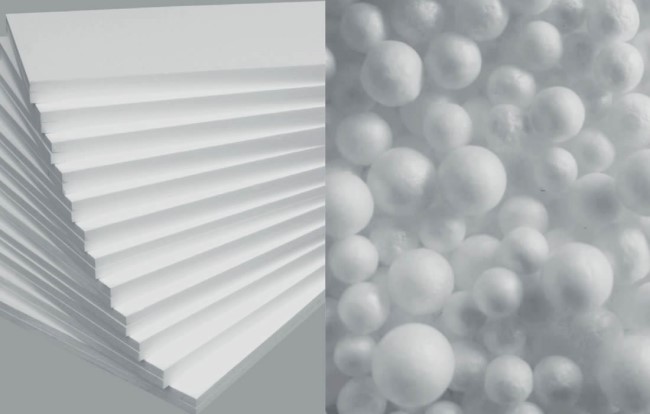Eps
Expanded Polystyrene Rigid Foam (EPS-Expanded Polystyren Foam) is a typically white colored thermoplastic material with foam in the form of foam, obtained from petroleum by polymerization of styrene monomer. Products in gray / black tones, in which the particles are processed to reflect the long-wave radiation, are also available.
In the EPS products obtained by inflating and fusing polystyrene particles, the blowing gas used to inflate the particles and to obtain foam is 'Pentane'. Pentane, which is an organic component, replaces with air during production and in a very short time after the production of many small pores in the particles. The released pentane gas turns into CO2 and water vapor-H2O, which is already present in the atmosphere. With the release of the pentane, stagnant air is trapped in a large number of small closed porous cells (3-6 billion in 1 m3 EPS, depending on the density) within the material. 98% of the material is inert air; 2% is polystyrene.
After the material is supplied as raw material in small particles, it undergoes pre-inflation. Meanwhile, the pentane gas in the particles is replaced by air, and the desired density of the material is largely achieved at this stage. Later, the expanded particles rested in special silolor are fused together with the help of water vapor in the mold and gained the properties of the material. As a result of the fusion of the grains, a continuous mass of polygons fused with each other occurs in the appearance of a honeycomb, without any gaps in between. The subsequent production steps vary according to the usage area of the material (for thermal insulation or packaging material) (+).
As is known, stagnant air is the most economical, environmentally friendly and excellent thermal insulation material known. The superior thermal insulation properties of EPS are due to the stagnant air it contains in its many particles. EPS, which is one of the few materials providing the best thermal insulation in the world, is the only material that provides the same performance more economically than other thermal insulation materials used in our country.
Thanks to its flexible structure, impact absorption and mechanical durability, the material is used in the packaging of many products for protection purposes and prevents the packaged products from being damaged. In addition, special types of EPS are used for the packaging of food materials, thanks to its thermal insulation and protection feature.
Another important reason is that its production is not energy intensive and it is economical despite its superior technical features. In addition to the effective mechanical resistance, the swelling gas is replaced with air in a very short time, ensuring that the performance of the product remains constant throughout its lifetime. Its thickness does not decrease, its thermal conductivity does not increase, its mechanical properties do not change, and its other properties do not deteriorate over time.
EPS is produced in desired densities according to the usage area. It does not cause unnecessary material waste and unnecessary cost increases as its properties can be changed in the desired direction. For thermal insulation purposes, it is generally at the density of 15-30 kg / m3; It is produced in 20-100 kg / m3 density for the purpose of use as packaging material. As a finished product, EPS also has features such as lightness, easy workability and usability in the manufacture of other materials and composite products.
Besides all these features, EPS is an environmentally friendly material since it is 100% recyclable and the materials it contains do not harm the atmosphere and ozone layer. Special types of EPS are also a product that can be used even in food packaging and are not harmful to human health.
EPS products are used extensively in the form of plates, pipes or pre-shaped elements, in the heat and sound insulation of buildings and in the packaging industry. It is not possible to count EPS products, from using them as wall materials in buildings, to insulation of cold stores, road construction in cold regions, reinforcement of floors, construction of life buoy and life jacket for ships; There is unlimited usage in all applications where lightness, strength, easy shaping, easy application and low thermal conductivity are important.

